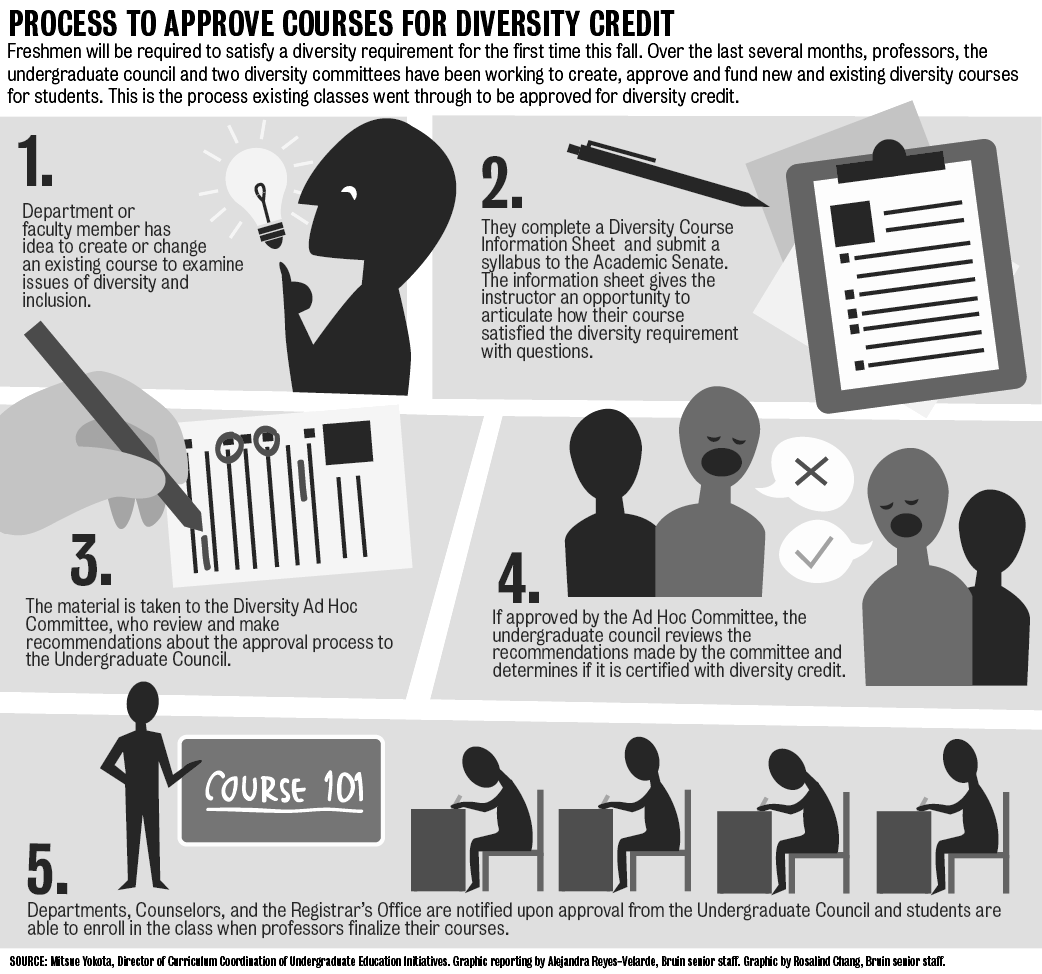Diversity initiative pushes to be inclusive of South Campus courses

By Alejandra Reyes-Velarde
Sept. 18, 2015 2:00 p.m.
This fall, students will be able to begin fulfilling the diversity requirement and enroll in courses that aim to integrate social issues with science- and math-oriented classes, which faculty hope will spark an interest in science courses in the context of diversity.
The initiative, which passed after 25 years of discussion, will require each incoming freshman student to take one course about inequalities in race, gender and sexual orientation, among other topics.
Kyle McJunkin, director of Academic Initiatives, said the Diversity Initiative Steering Committee, or DISC, asked faculty members to submit proposals for classes they think would encompass relevant social and cultural issues after the diversity initiative passed in April. The committee asked for courses to substantially address the experiences or perspective of at least two groups and allow students to develop critical and reflective perspectives about diversity.
The committee received 203 proposals for courses that would satisfy the requirement, six of which are proposals for entirely new courses, said Matthew Robinson, the principal committee analyst in the Academic Senate. About 125 courses have been officially approved as of now, but not all 125 courses will be taught each quarter.
McJunkin said he wanted to maximize South Campus students’ chances of taking diversity courses that also fulfill their major or minor requirements. Faculty members will offer diversity courses in humanities and social sciences departments, in addition to other subject areas such as statistics, society and genetics, and earth, planetary and space sciences courses.
Most classes that will be offered are existing courses that have been changed to adhere to the requirements, McJunkin said. DISC awarded faculty members a total of about $250,000 for diversity requirement courses. Some received $5,000, while others were granted up to $40,000.
Depending on the changes to the course, a faculty member can apply for funding to support graduate student researchers, teaching assistants or other resources for the class, he said. The committee began reviewing proposals in the spring.
Last winter, some faculty members and students petitioned against the diversity initiative because some thought it would extend students’ studies at UCLA. Others said they thought it was unnecessary because diversity is not something that should be taught in classes.
Professors who opposed the initiative did not respond to requests for comment.
McJunkin said diversity courses are spread out across curriculum including general education requirements, upper division courses, and minor and major requirements, which allows students to fulfill the requirement without taking additional classes.
William Newman, an earth, planetary and space sciences professor who helped draft the diversity initiative last winter, said he modified his course to include two research papers that ask students to consider how natural disasters affect different communities.
Newman said he is interested in how science and diversity issues interact because he has studied events that resulted in high mortality rates for the poor, while wealthier communities were able to recover.
“Disasters are not equal-opportunity events,” he said. “They single out the disadvantaged, the poor and those without the resources to survive.”
Newman said he wants students to take more active roles, learn to deal with these topics and understand how they differently impact specific parts of society. He added he is worried some students who focus heavily on the sciences may find it difficult to shift their mentality to incorporate diversity issues into these concepts.
“People come from all walks of life,” Newman said. “We all live on this planet, but many students may not appreciate why it’s important.”
Aaron Panofsky, a society and genetics professor, said his course, Society and Genetics 105B, will adjust to the requirement by having a stronger focus on diversity. Funding for the class, which is now open to all students, will go toward hiring a new teaching assistant to accommodate the expected larger class size. The class will examine aspects of human identity such as race, gender and sexuality at the intersections of sociological and biological perspectives.
Panofsky said he is creating a new course for spring which would examine diseases in a global context and how populations are affected in various ways depending on social, economic or cultural differences.
Panofsky said he thinks some faculty members were concerned the requirement would mandate South Campus students to take classes that weren’t relevant to their educations.
“It’s important to show diversity (affects) South Campus topics like biology, medicine and engineering,” Panofsky said. “There are questions in students’ minds all the time about the disparities between health and wealth.”
Kimberly Cienfuegos, a first-year English student, said she thinks the diversity requirement is important because students can benefit from learning about other perspectives.
“We live in a world that is diverse and I think being open to cultures is a skill that benefits students,” she said. “For example, in the fields of law and medicine, I think students will need (to understand diversity) in the long run.”
Cienfuegos said she thinks the requirement could improve campus climate, but it is ultimately up to students to make a change.
Daphne Jin, a second-year undeclared student, said she supports understanding other perspectives, but thinks students might not change their minds because they are being forced to learn about diversity in a class.
DISC will continue to accept proposals from faculty for new classes that could fulfill diversity credit until it thinks enrollment needs are satisfied, McJunkin said.


